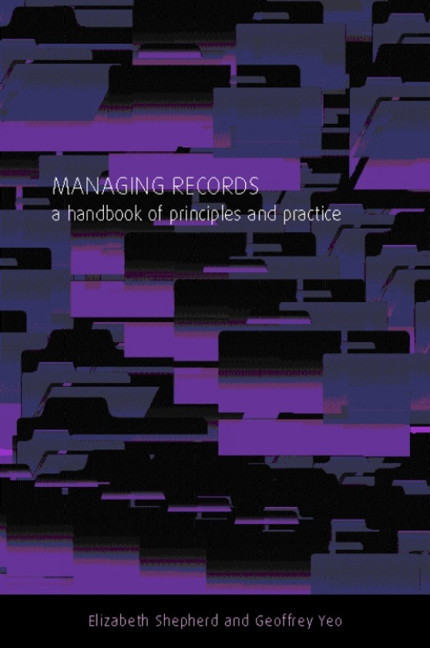Book contents
- Frontmatter
- Contents
- Preface
- Editorial note
- Introduction
- 1 Understanding records management
- 2 Analysing the context for records management
- 3 Classifying records and documenting their context
- 4 Creating and capturing records
- 5 Managing appraisal, retention and disposition
- 6 Maintaining records and assuring their integrity
- 7 Providing access
- 8 Implementing records management: practical and managerial issues
- Conclusion
- Appendix A Bibliography and sources of further information
- Appendix B Select list of national and international standards
- Appendix C Professional organizations for records managers in English-speaking countries
- Index
2 - Analysing the context for records management
Published online by Cambridge University Press: 09 June 2018
- Frontmatter
- Contents
- Preface
- Editorial note
- Introduction
- 1 Understanding records management
- 2 Analysing the context for records management
- 3 Classifying records and documenting their context
- 4 Creating and capturing records
- 5 Managing appraisal, retention and disposition
- 6 Maintaining records and assuring their integrity
- 7 Providing access
- 8 Implementing records management: practical and managerial issues
- Conclusion
- Appendix A Bibliography and sources of further information
- Appendix B Select list of national and international standards
- Appendix C Professional organizations for records managers in English-speaking countries
- Index
Summary
Records managers need to understand the context of their work at a number of different levels. They need knowledge of the records that are produced, the organizational activities that generate records and the systems used to control them. In addition, they should have a thorough understanding of the organization itself and how records management contributes to its objectives.
To gain this understanding, records managers must analyse the role and responsibilities of the organization, study its structures and working methods and discover how these have changed during its life. They also need to identify the broader issues that influence the way the organization operates, including its corporate culture and the interests and expectations of stakeholders within the organization and externally. Knowledge of the organization's operating environment is a key element in designing an effective records management programme.
When the records manager has investigated these broader aspects of the organization, the next task is to acquire a deeper understanding of its functions and the activities that are performed to support them. The knowledge gained from these investigations can then be used to assess how each of these factors affects the organization's needs for evidence and information, and the degree to which its needs are met by the existing records and records systems. Putting all these pieces together, the records manager can design and implement a programme that fits the organization's requirements.
This chapter examines analytical techniques that records managers can use to develop a wide view of an organization and their role within it. These techniques may be used when establishing a new records management programme and also in responding to changing circumstances when a programme is in operation.
Using analytical techniques
What techniques are available?
Records managers need to undertake a range of analyses, using techniques appropriate to each task (see Figure 2.1). One of these techniques, the records survey, has been developed by records managers themselves, but others were invented outside the records management field. Techniques for investigating the environment, culture and structure of organizations have been developed by management analysts, while functional and process analysis techniques are borrowed from information technology and systems analysts.
Analysis is an iterative process, since issues raised when one technique is used will often need further investigation using a related technique. The choice of an initial technique depends on the purpose of the analysis and the object to be analysed.
- Type
- Chapter
- Information
- Managing Recordsa handbook of principles and practice, pp. 30 - 71Publisher: FacetPrint publication year: 2003



